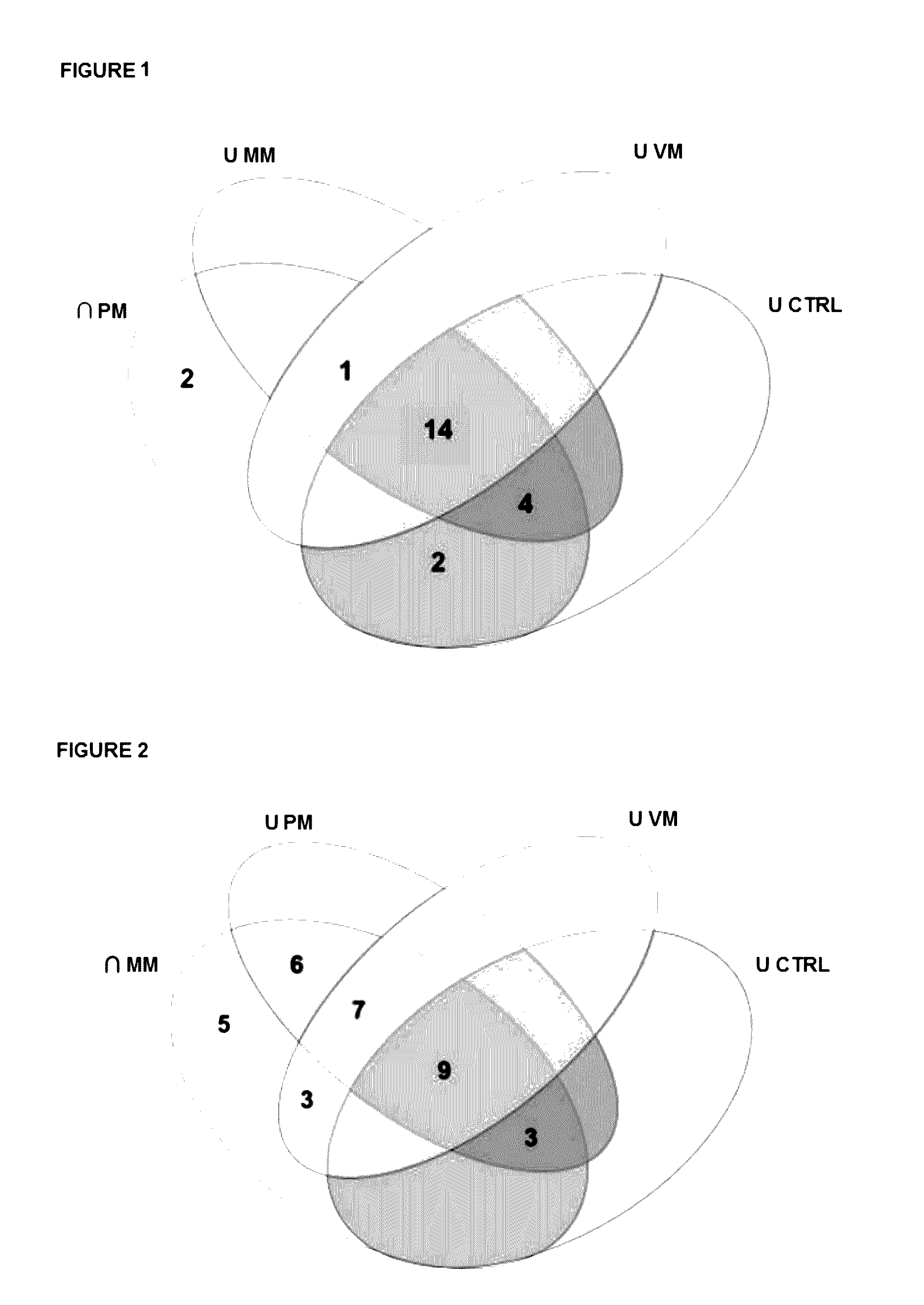Qualitative predictive method for differential diagnosis of pneumococcal, meningococcal and viral meningitis, method and kit for differential diagnosis of meningitis
- Summary
- Abstract
- Description
- Claims
- Application Information
AI Technical Summary
Benefits of technology
Problems solved by technology
Method used
Image
Examples
example 1
Casuistry
[0065]For the comparative analysis of the CSF proteome through two-dimensional gels, 18 patients affected by pneumococcal meningitis, meningococcal meningitis or viral meningitis and six control individuals were selected (Table 1), all undergoing CSF lumbar puncture. Immediately after CSF collection, the samples were centrifuged for cell separation and supernatants were frozen at −20° C., and subsequently at −80° C. until analyzed.
TABLE 1CHARACTERIZATION OF THE POPULATION UNDER STUDYSOCIO-DEMOGRAPHICALDATALABORATORY CLINICAL DATAH.H.ClinicalMeningeal%PatientsAgeGenderIJPIIGTsignFeversignsLeukocytesPMNProteinsGlucoseCultureGramLatexPM19yMxvomit(+)(+)5,6008044171(+)N / AN / A222yMxN / AN / AN / A1,4389018526N / A(+)N / A313yMxN / AN / AN / A4,4009318620(+)(+)(+)423yMxN / AN / AN / A645953352.5(+)(+)N / A536yMxN / AN / AN / A960874741.5(+)(+)N / A62yFxvomit;(+)(+)240921101(+)(+)(+)headacheMM113yFxvomit(+)(+)7256641N / A(+)N / A25mFxvomit(+)(+)2,560441873(+)(+)(+)312yFxvomit(+)(+)19,500964610(+)N / AN / A45yMxvomit(+)(+)...
example 2
[0072]CSF contains small molecules, salts, peptides, proteins and enzymes that play critical roles in many physiological processes. In order to improve the resolution of two-dimensional electrophoresis most of the salt content of the CSF must be removed to eliminate possible interferences.
[0073]CSF samples in raw state from patients affected by viral meningitis and controls exhibited a much lower protein concentration when compared with the protein concentrations of CSF samples from patients affected by bacterial meningitis. It is important to stress that more than 15% of the total protein content of the CSF corresponds to albumin and 15% or more, to immunoglobulins. Therefore, depletion of abundant proteins is essential to detect less representative proteins in the CSF. In order to obtain a sufficient amount of protein for the subsequent steps of the method of the instant invention, twice the volume of CSF in the raw state was used for samples from patients affecte...
example 3
Protein Separation by Two-dimensional Electrophoresis
[0075]Twelve two-dimensional gels containing 0.5 μg of CSF proteins (representing samples from six subjects and their technical duplicates) and control group were manufactured for each of meningitis etiology under study, for a total of 48 gels. The fixed amount of 0.5 μg protein was prepared for isoelectric focusing using 7 cm-IPG strips, pH 3-10NL in PROTEAN IEF Cell equipment (BioRad, PA, USA) at 20° C., 50 mA / gel under the conditions described below: passive rehydration for 4 hours, 20° C.; Step 1: 50 V, 12 hours; Step 2: 500 V, 30 minutes; Step 3: 1,000 V, 30 minutes; Step 4: 4,000 V, 1 hour; and Step 5: 4,000 V, 16,000 V-hr. After conducting the equilibration steps (reduction and alkylation of proteins), the strips were subjected to the process of protein separation by the second dimension, conducted through PAGE in a 12% polyacrylamide gel, and the gels were dyed with silver nitrate.
[0076]2DE gel images of patients' samples ...
PUM
 Login to View More
Login to View More Abstract
Description
Claims
Application Information
 Login to View More
Login to View More - R&D
- Intellectual Property
- Life Sciences
- Materials
- Tech Scout
- Unparalleled Data Quality
- Higher Quality Content
- 60% Fewer Hallucinations
Browse by: Latest US Patents, China's latest patents, Technical Efficacy Thesaurus, Application Domain, Technology Topic, Popular Technical Reports.
© 2025 PatSnap. All rights reserved.Legal|Privacy policy|Modern Slavery Act Transparency Statement|Sitemap|About US| Contact US: help@patsnap.com



